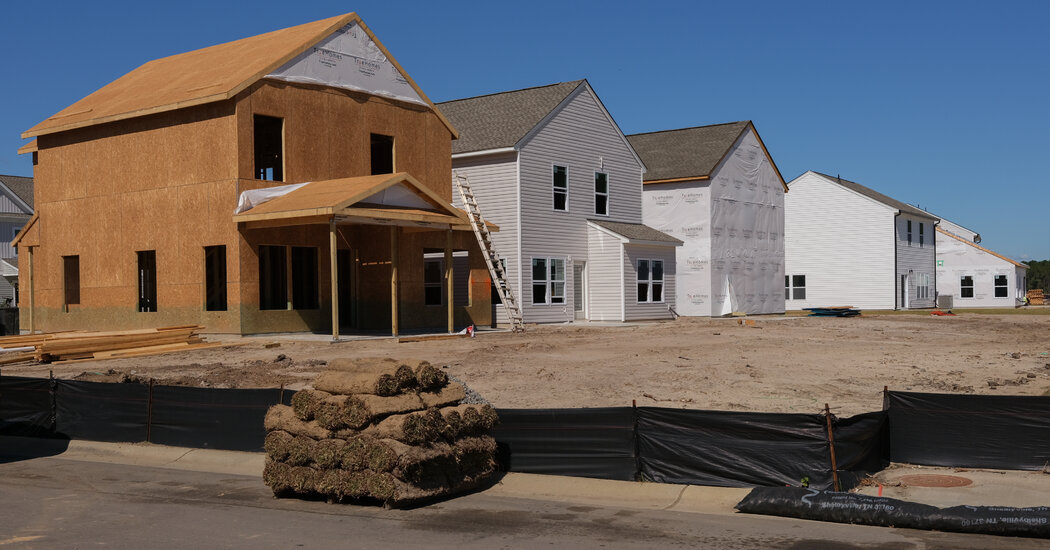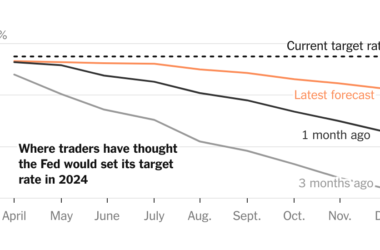Federal Reserve officials are planning to cut interest rates this year, real estate agents are likely to slash their commissions after a major settlement and President Biden has begun to look for ways his administration can alleviate high housing costs.
A lot of change is happening in the housing market, in short. While sales have slowed markedly amid higher interest rates, both home prices and rents remain sharply higher than before the pandemic. The question now is whether the recent developments will cool costs down.
Economists who study the housing market said they expected cost increases to be relatively moderate over the next year. But they don’t expect prices to actually come down in most markets, especially for home purchases. Demographic trends are still fueling solid demand, and cheaper mortgages could lure buyers into a market that still has too few homes for sale, even if lower rates could help draw in more supply around the edges.
“It has become almost impossible for me to imagine home prices actually going down,” said Glenn Kelman, the chief executive of Redfin. “The constraints on inventory are so profound.”
Here’s what is changing and what it could mean for buyers, sellers and renters.
Interest rates are expected to fall.
Mortgages have been pricey lately in part because the Fed has lifted interest rates to a more-than-two-decade high. The central bank doesn’t set mortgage rates, but its policy moves trickle out to make borrowing more expensive across the economy. Rates on 30-year mortgages have been hovering just below 7 percent, up from below 3 percent as recently at 2021.
Those rates could come down when the Fed lowers borrowing costs, particularly if investors come to expect that it will cut rates more notably than what they currently anticipate.
Mortgage rates and some other borrowing costs tend to adjust when investors shift their expectations for what the Fed will do, rather than when the central bank actually makes a move. That is one reason mortgage rates have been drifting lower from a peak of about 7.8 percent in late 2023: Inflation has eased, and it has become clear that the Fed could soon reduce its policy rate.
Central bankers projected on Wednesday that they could make three rate cuts this year and three more next year.
Some analysts think mortgage rates could drop further in 2024. Greg McBride at Bankrate, for instance, thinks they could end the year around 6 percent.
Cheaper borrowing costs will have two big effects on the housing market. First, they make it slightly less expensive to finance a purchase: The monthly payment on a $400,000 mortgage with a 7.8 percent rate is about $2,880, but more like $2,400 with a 6 percent rate. Such a decline could stoke demand from would-be buyers.
Second, lower rates could induce more homeowners to sell. Many Americans are sitting on cheap mortgages that they refinanced during the pandemic and are hesitant to give them up to move. The smaller the gap between those existing mortgages and market mortgage rates becomes, the more that rate lock-in might disappear — potentially making more starter homes available.
Broker practices are poised to shift.
It’s not just the cost of borrowing that could effect the housing market. The National Association of Realtors, a powerful group that has long set the guidelines for home sales, has agreed to settle a series of lawsuits in a move that could shake up home buying.
Pending court approval, the settlement would mean that agents working with home sellers would no longer have to offer clearly advertised compensation to buyers’ agents. The change is likely to pull down the industrywide standard commission of 5 or 6 percent.
It’s not clear exactly what that will mean for home costs. There is speculation that it could reduce prices, in part because lower commissions could make it slightly more attractive for sellers to list their homes.
But there are limits to how much prices may come down. Igor Popov, chief economist at Apartment List, said that while the decision could save Americans money on transaction costs, home sellers were likely to keep trying to charge as much as they could in competitive markets.
“It’s a big deal for the industry, but I don’t think it’s a big deal for prices and quantities,” he said.
Agents are unsure what the fallout will look like. Jovanni Ortiz, a Realtor on Long Island, said that he had heard colleagues wondering whether agents might leave the business — but that nobody was sure exactly how much this would cost agents and reshape home shopping.
“It’s still too soon to say,” Mr. Ortiz said.
The White House has policies in mind.
President Biden has fixated on high housing costs in recent weeks, wary that Americans’ struggles to make rent or buy a home are weighing on the nation’s economic optimism.
He announced new ideas to aid home buyers in his State of the Union address. His latest budget request contains more than $250 billion in spending proposals to tackle high housing costs, including building or rehabbing two million housing units and increasing rental assistance for low-income workers.
But most of those ideas seem unlikely to have an immediate effect: There appears to be little chance of passing a major housing bill this year, with the November election looming and Republicans in control of the House.
Still, Mr. Biden has directed his administration to act unilaterally to reduce some costs associated with home buying. He has moved to eliminate title insurance fees for federally backed mortgages, potentially saving $1,000 or more per purchase. This week, he called on real estate agents to pass the savings from lower required commissions on to consumers.
Housing supply is increasing in rentals, but that could be short-lived.
If there is one bright spot in housing affordability right now, it is the rental market.
A serious supply crunch has been easing in recent months, allowing rents on new leases to grow only moderately or even fall in some markets.
A bunch of big rental buildings were constructed in some Southern and Mountain West cities, taking pressure off monthly prices. But relatively little new inventory is coming next year and in 2026, Mr. Popov said, so that cool-down may be limited.
The supply of for-sale houses is a less sunny story. It’s not just that fewer sellers have been putting houses on the market — home construction has taken a hit from higher interest rates. That has exacerbated a shortage that has been worsening for years, and it has meant that prices have remained elevated even though high mortgage rates have depressed sales of both new and existing homes.
As builders see signs of a market thaw, they may be more willing to construct new houses. But that will come as many shoppers are likely to be enticed by slightly lower rates.
“Demand is so strong that it’s unlikely that the housing market will fall apart,” said Yelena Shulyatyeva, a senior economist at BNP Paribas, noting that many millennials are still looking to buy, among other trends.
The upshot? Mr. Popov thinks the housing market could return to something more like normal in the months ahead — prices are unlikely to fall, but the increases may be slower and steadier relative to the big bounces since 2020.
“We’ve been feeling the aftershocks of the many powerful hits to the housing market that the pandemic brought,” he said. “We’re going to return to more normal numbers, and a more normal feeling in the housing market.”




